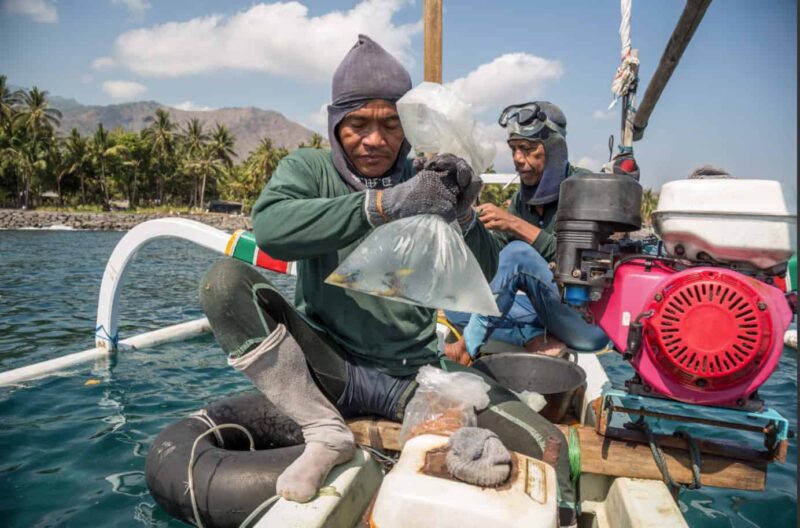In 2019, Internews’ Earth Journalism Network awarded a story grant to journalists Ingrid Gercama and Nathalie Bertrams, enabling them to complete a multi-country investigation of the international trade in tropical fish and coral. By interviewing fish and coral collectors in Kenya and Indonesia, international traders along the supply chain, and scientists and fish collectors in Europe, they exposed the scale of the trade and the risk that European buyers could be driving illegal and unsustainable harvesting.
“It is a story about globalization, natural resource extraction and environmental destruction,” says Bertrams. “I stumbled over it when I met a Sri Lankan fisherman diving for tropical fish in Somaliland. Until then, I had assumed that all aquarium fish were captive-bred.”
She and Gercama started looking into trade figures, and Bertrams said they were surprised to find that hundreds of millions of fish are caught from the reefs and sold around the world.
“Just the sheer scale of the trade is incredible, and it immediately sparked our interest,” she said.
After a months-long investigation, Bertrams and Gercama produced stories in German for Süddeutsche Zeitung and Tages-Anzeiger, in Dutch for the Groene Amsterdammer and MO*, and in English for the BBC website (see EJN’s summary for links to each story). These reports highlighted both environmental issues and social problems facing people supplying the trade.
“The inequality of the trade really hit us when talking to Bajau fishermen in Indonesia,” said Gercama. “They go out to sea every day and dive until they are cold and tired, to find the colourful fish that we in the Netherlands like to hold in our aquariums — for pleasure.”
The investigation also highlighted ways the tropical fish trade promotes unsustainable or illegal practices in Africa and Asia. It showed how illegal cyanide fishing and the overharvesting of desirable fish are harming the ecology of coral reefs. And it revealed how illegally collected wild corals from Indonesia are being smuggled to Singapore for onward trade to Europe.
By exposing these problems, the article in the Groene Amsterdammer highlighted the role that European hobbyists play in driving them, whether they realise it or not. The article led two Dutch Members of Parliament to write to Government Ministers seeking answers to 10 questions about the sustainability and legality of the trade in corals and fish from tropical seas to the Netherlands.
On 9 March 2020, Carola Schouten — who is both deputy prime minister and the minister of Agriculture, Nature and Food Quality — formally replied in a letter to the chairman of the House of Representatives in The Hague.
The answers revealed that the government could only provide data on protected species for which trade is regulated under the Convention on International Trade in Endangered Species of Wild Fauna and Flora (CITES), but that “the vast majority of tropical fish imported are not covered by the CITES Convention.”
According to the communication, the Dutch government now acknowledges “legitimate questions about the volume of trade in ornamental tropical fish and coral that are not protected by the CITES Convention and the potential negative impact on the conservation of these species in the wild and affected ecosystems.”
The letter also stated: “In addition, alertness to the conservation of the wild populations of species that are not on CITES is important.”
It said that the Netherlands will continue to support CITES and the European Union in fighting wildlife crime.
“It is fantastic to see the impact that our project had,” said Gercama.
Their articles on the global fish and coral trade were published in German, Swiss, Dutch, Belgian and British media, and shared over 3,300 times directly on social media, she noted. “Our BBC article was also cited in news sites around the world,” Gercama said.
Aside from gaining political traction in the Netherlands, the investigation has been picked up by tropical fish-keeping associations as well as associations of divers, both in Belgium and Switzerland. For example, the Swiss Underwater Sports Association (SUSV) reprinted the Süddeutsche Zeitung article in its magazine. The investigation was also shared on various online hobbyist forums.
Specialist environmental news agencies and animal rights associations that have shared and discussed the investigation include Green Echoes, German animal rights association Tier im Recht and the German Reference Centre for Ethics in the Life Sciences (DRZE).
“We also found out that the Swiss animal rights organisation Fair Fish cited our article — which was published in five German-language newspapers across Switzerland — in their Fish Facts newsletter,” said Gercama. “They also quoted our research in their campaign material on aquarium sustainability.”
Asked what she learned from the investigation, she said: “It is quite strange when you think about it, that the small fish you see swimming in your local aquarium shop once swam in a tropical sea, more than 10,000 kilometers away. The investigation shows that we need to take better care of our oceans, and that we don’t know the long-term effects our actions have on this unique ecosystem.”
EJN’s supported this work through its Investigating Wildlife Trafficking project, thanks to funding from the Oak Foundation. Other funders of the investigation were the Robert Bosch Foundation, Free Press Unlimited and Fonds BJP.
(Banner photo: Nyoman Jabo Sujana and his colleague made with their catch of the day. Credit: Nathalie Bertrams and Ingrid Gercama)
